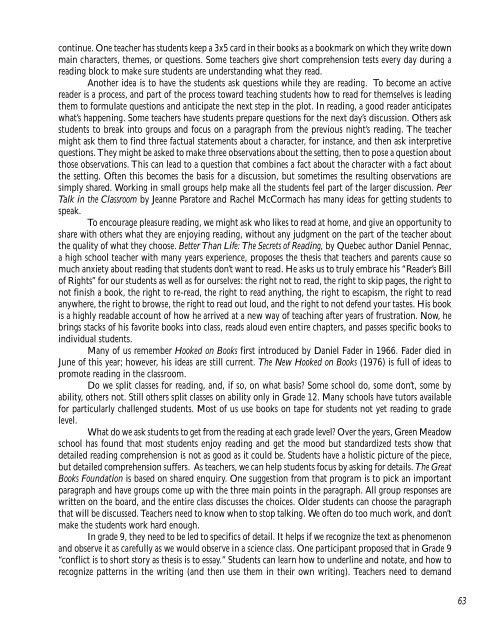Colloquium on English - Research Institute for Waldorf Education
Colloquium on English - Research Institute for Waldorf Education
Colloquium on English - Research Institute for Waldorf Education
Create successful ePaper yourself
Turn your PDF publications into a flip-book with our unique Google optimized e-Paper software.
c<strong>on</strong>tinue. One teacher has students keep a 3x5 card in their books as a bookmark <strong>on</strong> which they write down<br />
main characters, themes, or questi<strong>on</strong>s. Some teachers give short comprehensi<strong>on</strong> tests every day during a<br />
reading block to make sure students are understanding what they read.<br />
Another idea is to have the students ask questi<strong>on</strong>s while they are reading. To become an active<br />
reader is a process, and part of the process toward teaching students how to read <strong>for</strong> themselves is leading<br />
them to <strong>for</strong>mulate questi<strong>on</strong>s and anticipate the next step in the plot. In reading, a good reader anticipates<br />
what’s happening. Some teachers have students prepare questi<strong>on</strong>s <strong>for</strong> the next day’s discussi<strong>on</strong>. Others ask<br />
students to break into groups and focus <strong>on</strong> a paragraph from the previous night’s reading. The teacher<br />
might ask them to find three factual statements about a character, <strong>for</strong> instance, and then ask interpretive<br />
questi<strong>on</strong>s. They might be asked to make three observati<strong>on</strong>s about the setting, then to pose a questi<strong>on</strong> about<br />
those observati<strong>on</strong>s. This can lead to a questi<strong>on</strong> that combines a fact about the character with a fact about<br />
the setting. Often this becomes the basis <strong>for</strong> a discussi<strong>on</strong>, but sometimes the resulting observati<strong>on</strong>s are<br />
simply shared. Working in small groups help make all the students feel part of the larger discussi<strong>on</strong>. Peer<br />
Talk in the Classroom by Jeanne Paratore and Rachel McCormach has many ideas <strong>for</strong> getting students to<br />
speak.<br />
To encourage pleasure reading, we might ask who likes to read at home, and give an opportunity to<br />
share with others what they are enjoying reading, without any judgment <strong>on</strong> the part of the teacher about<br />
the quality of what they choose. Better Than Life: The Secrets of Reading, by Quebec author Daniel Pennac,<br />
a high school teacher with many years experience, proposes the thesis that teachers and parents cause so<br />
much anxiety about reading that students d<strong>on</strong>’t want to read. He asks us to truly embrace his “Reader’s Bill<br />
of Rights” <strong>for</strong> our students as well as <strong>for</strong> ourselves: the right not to read, the right to skip pages, the right to<br />
not finish a book, the right to re-read, the right to read anything, the right to escapism, the right to read<br />
anywhere, the right to browse, the right to read out loud, and the right to not defend your tastes. His book<br />
is a highly readable account of how he arrived at a new way of teaching after years of frustrati<strong>on</strong>. Now, he<br />
brings stacks of his favorite books into class, reads aloud even entire chapters, and passes specific books to<br />
individual students.<br />
Many of us remember Hooked <strong>on</strong> Books first introduced by Daniel Fader in 1966. Fader died in<br />
June of this year; however, his ideas are still current. The New Hooked <strong>on</strong> Books (1976) is full of ideas to<br />
promote reading in the classroom.<br />
Do we split classes <strong>for</strong> reading, and, if so, <strong>on</strong> what basis? Some school do, some d<strong>on</strong>’t, some by<br />
ability, others not. Still others split classes <strong>on</strong> ability <strong>on</strong>ly in Grade 12. Many schools have tutors available<br />
<strong>for</strong> particularly challenged students. Most of us use books <strong>on</strong> tape <strong>for</strong> students not yet reading to grade<br />
level.<br />
What do we ask students to get from the reading at each grade level? Over the years, Green Meadow<br />
school has found that most students enjoy reading and get the mood but standardized tests show that<br />
detailed reading comprehensi<strong>on</strong> is not as good as it could be. Students have a holistic picture of the piece,<br />
but detailed comprehensi<strong>on</strong> suffers. As teachers, we can help students focus by asking <strong>for</strong> details. The Great<br />
Books Foundati<strong>on</strong> is based <strong>on</strong> shared enquiry. One suggesti<strong>on</strong> from that program is to pick an important<br />
paragraph and have groups come up with the three main points in the paragraph. All group resp<strong>on</strong>ses are<br />
written <strong>on</strong> the board, and the entire class discusses the choices. Older students can choose the paragraph<br />
that will be discussed. Teachers need to know when to stop talking. We often do too much work, and d<strong>on</strong>’t<br />
make the students work hard enough.<br />
In grade 9, they need to be led to specifics of detail. It helps if we recognize the text as phenomen<strong>on</strong><br />
and observe it as carefully as we would observe in a science class. One participant proposed that in Grade 9<br />
“c<strong>on</strong>flict is to short story as thesis is to essay.” Students can learn how to underline and notate, and how to<br />
recognize patterns in the writing (and then use them in their own writing). Teachers need to demand<br />
63

















